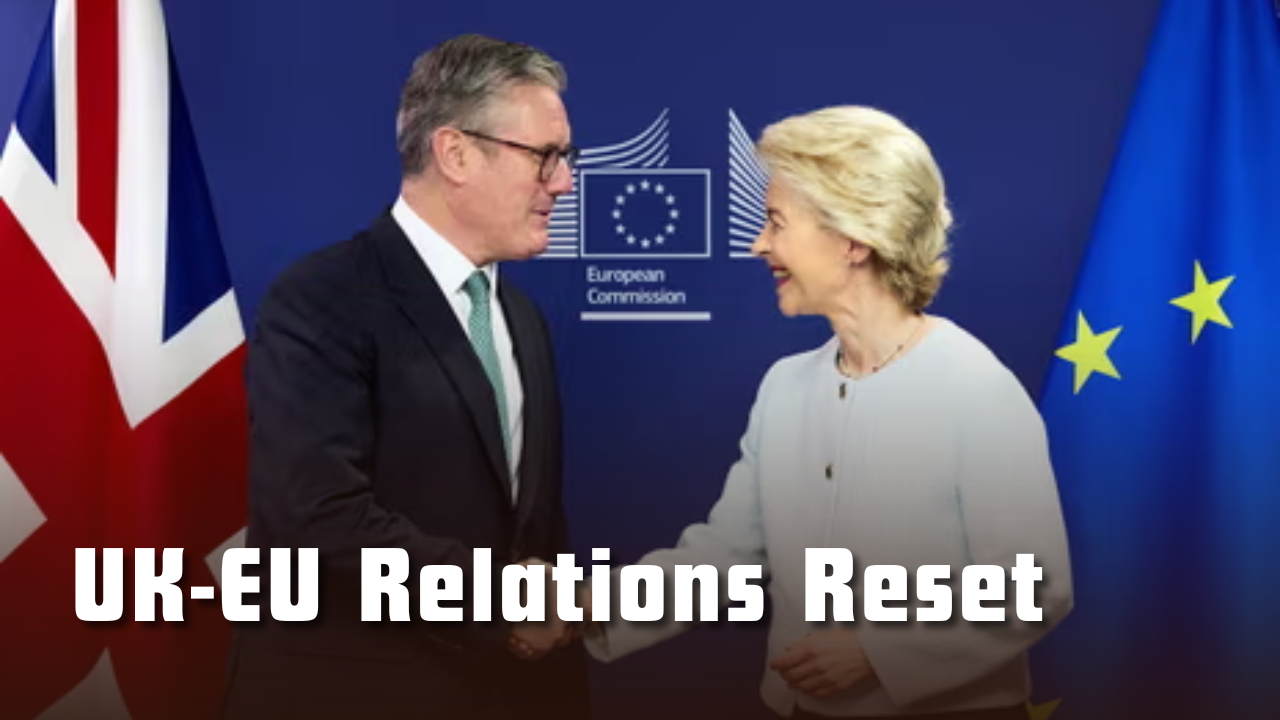UK-EU Relations Reset
A Eurocentric reset, a gateway for India
Context: In a landmark diplomatic development, newly elected UK Prime Minister Keir Starmer has initiated a fresh agreement with the European Union (EU), aimed at rebuilding cooperation on food standards, fishing rights, defence, and border checks.
More on News
- While this move primarily addresses post-Brexit tensions in Europe, it carries wide-reaching consequences for India—especially in areas of trade, strategic diplomacy, and diaspora mobility.
Why the UK-EU Reset Matters for India?
- India maintains robust trade and diplomatic relations with both the UK and the EU.
- In FY2024, India exported goods worth $86 billion to the EU and $12 billion to the UK.
- The new UK-EU alignment could harmonise regulations, streamline cross-border trade, and redefine India’s engagement strategy with Europe.
- For Indian businesses, exporters, students, and professionals, this development could open up new corridors of opportunity while presenting policy and regulatory challenges.
Impact on Indian Exports: Simplified Compliance and Greater Market Access
The renewed cooperation between the UK and EU on regulatory standards could transform India’s export landscape, especially in sectors such as pharmaceuticals, seafood, textiles, and agro-products.
- Pharmaceutical Exports: India, which supplies over 25% of the UK’s generic medicines, stands to benefit from a unified drug approval process, reducing delays and increasing cost-efficiency.
- Seafood and Agro-based Products: Indian seafood exports, valued at ₹60,523.89 crore (~$7.38 billion) in FY2024, could face fewer barriers if food safety and fisheries standards are harmonised.
- However, stricter compliance rules may challenge India’s small and medium enterprises (SMEs).
- Strategic Reforms Needed: To stay competitive, India must bolster schemes like the Production-Linked Incentive (PLI) and Remission of Duties and Taxes on Exported Products (RoDTEP), while upgrading testing, packaging, and logistics infrastructure to meet enhanced Western standards.
Geopolitical Leverage: A Stronger Voice in Global Governance
The strategic reset between the UK and EU also enhances India’s scope for multilateral diplomacy. As the UK recalibrates its foreign policy to align more closely with the EU, India can position itself as a crucial partner in areas like:
- Defence and Maritime Security: India’s existing strategic partnerships with France, Germany, and the UK are key to its defence modernisation, especially in naval power.
- A cohesive UK-EU defence policy could enable joint Indo-Pacific engagements and deepen trilateral collaborations.
- Global Governance and Climate Finance: India’s leadership during the 2023 G20 Summit showcased its clout in the Global South.
- A coordinated Western bloc could amplify India’s influence on key issues such as global governance reforms, climate action, and digital infrastructure development.
- Technological Collaboration: Defence technology transfer and co-development agreements with the UK and Germany can benefit from greater UK-EU policy coherence, leading to enhanced joint ventures and innovation sharing.
Migration and Talent Mobility: Opportunities for Indian Diaspora
India boasts the world’s largest diaspora, with significant populations in both the UK and EU. The UK issued over 1,10,000 student visas to Indian nationals in 2024, placing India among its top contributors of international students.
- Talent Mobility Corridor: Renewed UK-EU cooperation on border checks and migration could lead to a semi-integrated mobility regime, making it easier for Indian professionals and students to access both markets.
- Enhanced Migration Pacts: India’s bilateral migration agreements with countries like France, Germany, and Portugal could gain traction under a broader UK-EU framework, boosting skilled migration and talent retention.
India’s Strategic Next Steps
To make the most of the UK-EU diplomatic reset, India must act decisively on multiple fronts:
- Modernise Export Infrastructure: Invest in cold chain logistics, warehousing, and quality control to meet evolving EU-UK standards.
- Accelerate Trade Negotiations: Finalise pending FTAs, especially the India-EU Free Trade Agreement and India-UK FTA, to lock in trade advantages.
- Strengthen Strategic Alliances: Leverage existing defence and technology pacts to expand trilateral cooperation in the Indo-Pacific.
- Enhance Diaspora Engagement: Align student mobility, skill development, and migration pacts to new border and employment dynamics in the West.
The UK-EU reconciliation is far more than a regional policy shift—it’s a reset with global resonance. For India, this is a rare opportunity to enhance trade competitiveness, deepen strategic alliances, and unlock talent mobility. With proactive reforms and smart diplomacy, India can not only navigate the new transatlantic order but lead within it.
Subscribe to our Youtube Channel for more Valuable Content – TheStudyias
Download the App to Subscribe to our Courses – Thestudyias
The Source’s Authority and Ownership of the Article is Claimed By THE STUDY IAS BY MANIKANT SINGH



